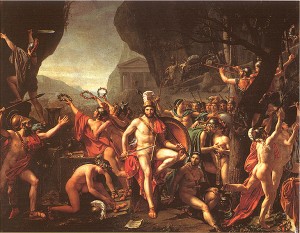 Thermopylae was a pass in the mainland Greece. The access to this pass was of strategic importance to the invading forces, as it is the only major pathway to make further inroads into the mainland. The Greek forces were unsuccessful in their attempt to hold on to this pass against the invading Persian forces. The war that took place between these two confronting armies in 480 B.C. has come to be known as the Battle of Thermopylae.
Thermopylae was a pass in the mainland Greece. The access to this pass was of strategic importance to the invading forces, as it is the only major pathway to make further inroads into the mainland. The Greek forces were unsuccessful in their attempt to hold on to this pass against the invading Persian forces. The war that took place between these two confronting armies in 480 B.C. has come to be known as the Battle of Thermopylae.
The Spartans, who formed the bulk of the defending Greek forces, were all killed. Outnumbered by the Persian soldiers, the Spartans must have known the impending doom in advance. Yet, they displayed exemplary loyalty and carried on the defense of Thermopylae. Though Thermopylae was eventually lost to the Persians, the valor displayed by the Spartans proved to be an inspiration for the Greek soldiers. In this spirit, the Greeks did gain some lost ground in battles that were to follow, albeit on a smaller scale. (Cartledge, p.45)
The Persians were led by Xerxes. He led his fleet of battle ships from the coasts of northern Greece into the Gulf of Malia. The mountainous terrain along this coast acted as a natural fort for Greece. The only way the invaders can capture the Greek capital was by accessing the Thermopylae pass. This fact was understood by both the opposing forces, and hence made great efforts to hold this important passage across the mountains.
Xerxes’ reading of his challenge was quite accurate. He knew that he needed a large army of soldiers to tire, dent and eventually overwhelm the Spartan soldiers. So he assembled his army from across the length and breadth of what was a sprawling Persian empire. The end result was a mammoth gathering of soldiers that was 2.6 million strong. This figure does not include the men involved in support operations like ship crew, etc. It could be asserted that the battle was decided by this single factor – the number of men in confrontation on both sides. The Spartans were simply outnumbered and hence out-matched. Yet it is not for the ultimate result that the Greeks who lost their lives be remembered. It is for the way they marched ahead fully cognisant of their fates. (Cartledge, p.65)
The defending Spartans were led by an equally competent Leonidas, who was the King as well as the General. The primary objective of Leonidas was to keep the Persians away from stationed Greek navy. Leonidas believed that if his forces can engage the Persians at thermopylae for a long enough time, they would have to eventually retreat when their food supplies run out. Yet, Leonidas was not oblivious to the overall superiority of the Persians. He knew that only an inspired effort from his men can achieve this objective, upon which much is at stake. (Englewood, p.110)
It was a tradition in Sparta to pay homage to their martyrs in the way of ceremonies and special rituals. The whole citizenry would participate in such events and it was an integral aspect of Greek culture. But sadly for Leonidas, such symbolic reverence after death could not be accorded. It was only by chance that his body was identified and recovered in a decomposed state forty years after his death. (Englewood, p.115)